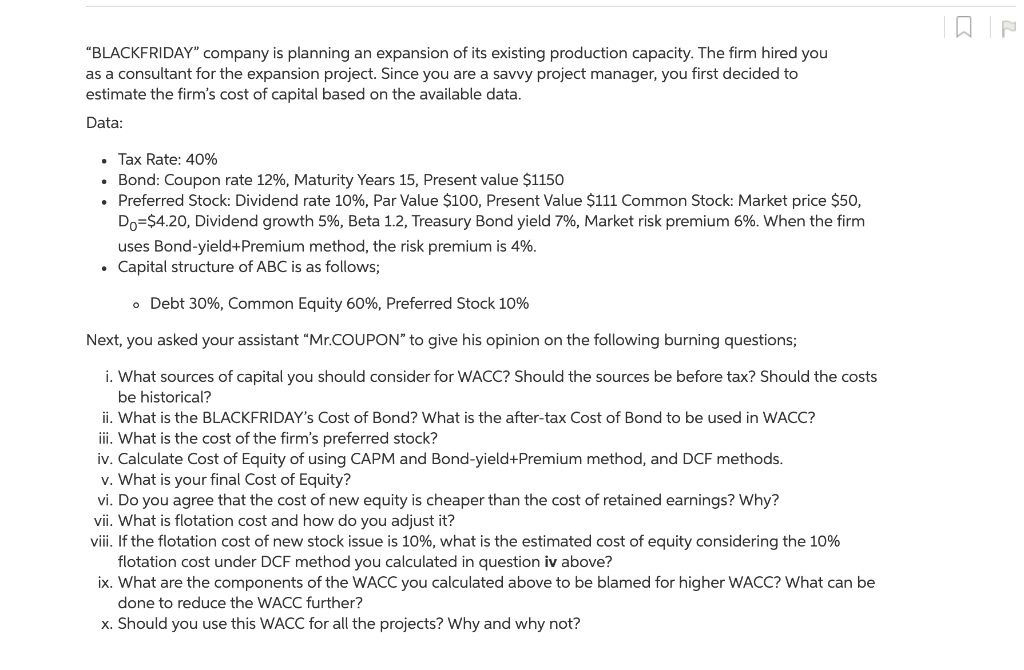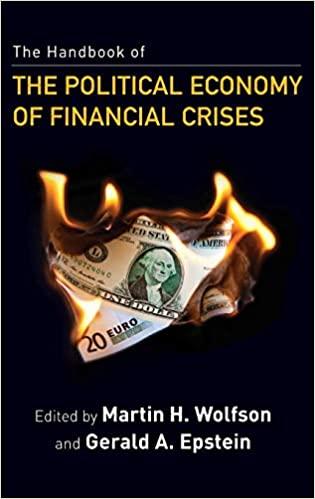Answered step by step
Verified Expert Solution
Question
1 Approved Answer
The final cost of equity is 13%. Please solve parts VI to X . BLACKFRIDAY company is planning an expansion of its existing production capacity.

The final cost of equity is 13%. Please solve parts VI to X .
"BLACKFRIDAY" company is planning an expansion of its existing production capacity. The firm hired you as a consultant for the expansion project. Since you are a savvy project manager, you first decided to estimate the firm's cost of capital based on the available data. Data: Tax Rate: 40% Bond: Coupon rate 12%, Maturity Years 15, Present value $1150 Preferred Stock: Dividend rate 10%, Par Value $100, Present Value $111 Common Stock: Market price $50, Do=$4.20, Dividend growth 5%, Beta 1.2, Treasury Bond yield 7%, Market risk premium 6%. When the firm uses Bond-yield+Premium method, the risk premium is 4%. Capital structure of ABC is as follows; Debt 30%, Common Equity 60%, Preferred Stock 10% Next, you asked your assistant "Mr.COUPON" to give his opinion on the following burning questions; i. What sources of capital you should consider for WACC? Should the sources be before tax? Should the costs be historical? ii. What is the BLACKFRIDAY's Cost of Bond? What is the after-tax Cost of Bond to be used in WACC? iii. What is the cost of the firm's preferred stock? iv. Calculate Cost of Equity of using CAPM and Bond-yield+Premium method, and DCF methods. v. What is your final Cost of Equity? vi. Do you agree that the cost of new equity is cheaper than the cost of retained earnings? Why? vii. What is flotation cost and how do you adjust it? vii. If the flotation cost of new stock issue is 10%, what is the estimated cost of equity considering the 10% flotation cost under DCF method you calculated in question iv above? ix. What are the components of the WACC you calculated above to be blamed for higher WACC? What can be done to reduce the WACC further? x. Should you use this WACC for all the projects? Why and why not? "BLACKFRIDAY" company is planning an expansion of its existing production capacity. The firm hired you as a consultant for the expansion project. Since you are a savvy project manager, you first decided to estimate the firm's cost of capital based on the available data. Data: Tax Rate: 40% Bond: Coupon rate 12%, Maturity Years 15, Present value $1150 Preferred Stock: Dividend rate 10%, Par Value $100, Present Value $111 Common Stock: Market price $50, Do=$4.20, Dividend growth 5%, Beta 1.2, Treasury Bond yield 7%, Market risk premium 6%. When the firm uses Bond-yield+Premium method, the risk premium is 4%. Capital structure of ABC is as follows; Debt 30%, Common Equity 60%, Preferred Stock 10% Next, you asked your assistant "Mr.COUPON" to give his opinion on the following burning questions; i. What sources of capital you should consider for WACC? Should the sources be before tax? Should the costs be historical? ii. What is the BLACKFRIDAY's Cost of Bond? What is the after-tax Cost of Bond to be used in WACC? iii. What is the cost of the firm's preferred stock? iv. Calculate Cost of Equity of using CAPM and Bond-yield+Premium method, and DCF methods. v. What is your final Cost of Equity? vi. Do you agree that the cost of new equity is cheaper than the cost of retained earnings? Why? vii. What is flotation cost and how do you adjust it? vii. If the flotation cost of new stock issue is 10%, what is the estimated cost of equity considering the 10% flotation cost under DCF method you calculated in question iv above? ix. What are the components of the WACC you calculated above to be blamed for higher WACC? What can be done to reduce the WACC further? x. Should you use this WACC for all the projects? Why and why not
Step by Step Solution
There are 3 Steps involved in it
Step: 1

Get Instant Access to Expert-Tailored Solutions
See step-by-step solutions with expert insights and AI powered tools for academic success
Step: 2

Step: 3

Ace Your Homework with AI
Get the answers you need in no time with our AI-driven, step-by-step assistance
Get Started


